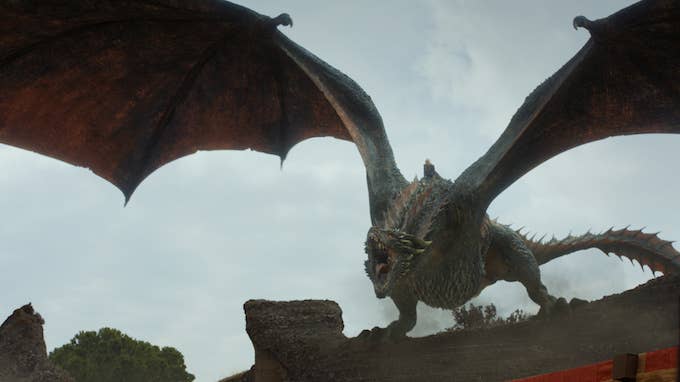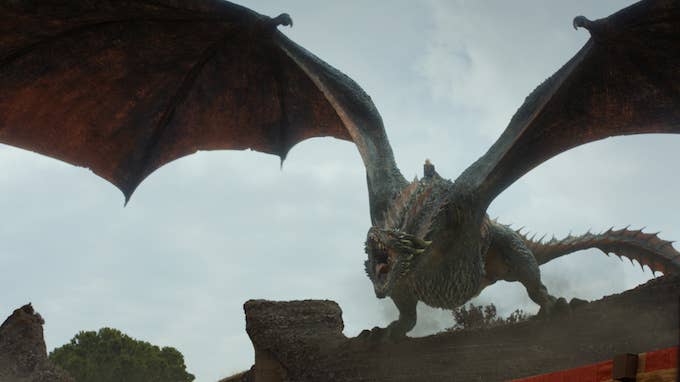
Why did you first start watching Game of Thrones? I can say that personally, I was offered an intricate storyline filled to the brim with unusually complex characters; here was a show that was unafraid to subvert everything you thought a show could do, leaving you with a jaw permanently on the floor (and, yeah, I was promised lots of boobs too). There was to be family betrayals, sudden gory deaths and lots of incest. The season 7 finale, The Dragon and the Wolf, had all of those elements. Jamie finally decided to leave Cersei’s side, Littlefinger finally got a knife to the throat in a big plot twist, and we saw Kit Harington’s shockingly pale ass during a highly-anticipated yet deeply incestuous sex scene with Daenerys.
What originally made Game of Thrones fun was its complex source material that was continually surprising because it subverted audience expectation time and time again (consider Ned Stark’s death, the Red Wedding, or even Jon Snow’s death). But ever since the show outpaced George R.R. Martin’s novels at the end of season five, D.B. Weiss and David Benioff have been working to hit certain milestones to reach a specific endgame within a finite number of episodes all the while maintaining an atmosphere fans have grown to love. For the entirety of season seven but especially during The Dragon and the Wolf, it appears Weiss and Benioff have chosen to sacrifice character and plot complexity for its storyline, and in so doing have muted the show’s element of surprise. The result is a series of boring, predictable episodes full of awesome dragonfire but ultimately lacking in the kind of substance we’ve come to expect of the show.
One way Weiss and Benioff have dulled the show’s shock factor is by plainly contriving tense storylines in order to make expected plot points more interesting. Take, for example, Arya and Sansa’s growing animosity towards each other. It was frustrating to watch, especially as Littlefinger, their common enemy, is still stirring the pot. Arya finally killing Littlefinger with his own knife and a flick of her wrist this week was, without a doubt, satisfying as hell, but hardly shocking. Littlefinger had run his course; he felt like extra baggage at this point. That said, just killing him would’ve been too easy, so the show created tension between Arya and Sansa to pave the way for a plot twist to try to spice up a moment that had become inevitable. The problem is that this specific conflict was hard to believe: would a calm and calculated assassin like Arya really murder her own sister? Could Arya, someone with her head on straight enough to have Cersei’s name high on her kill list, really not see that Sansa had been forced by the murderous queen to send that raven back in season one? If it had been real, it would’ve undone many season’s worth of character development. A show that relies on contrived plot elements is a show that’s hard to trust.
The big meeting in King’s Landing in this episode felt like another contrived plot point designed so that every who hadn’t yet met each other could finally meet. It promised tension, but it was ultimately anticlimactic, and as was to be expected, Cersei is only out for herself, and her ulterior motives about where her army will really be led her to lie to everyone present. That’s all predictable behavior from Cersei, but this time her selfishness led her to finally lose Jaime. The only thing left in Westeros that humanized Cersei was her intense love for her family and her strong will to defend them. Without her children, father, and now without Jaime, she becomes a Joffrey or Ramsay-like villain, totally unhinged, ruthless and evil to the very last breath.

Such a one-sided villain will always have their days numbered, because it’s far more interesting when a villain has motivations or limitations. She claims she’s pregnant, but Maggy the Frog’s prophecy from season five insists she will only have three children, and finally losing her last hope in life would be the her final straw. It’s hard to really root for an endgame in which Cersei would sit on the Iron Throne, but now that she’s untethered to any humanity, well, her end is inevitable. Her storyline has been wrapped up in a way that makes her end predictable, so it’s only a matter of connecting the dots until we get to what will be an undoubtedly satisfying death. By alienating her so quickly in one episode, the showrunners robbed the audience of the ability to be shocked or repulsed by Cersei ever again, because although she can still wreak havoc, we can effectively rule her out of the show’s endgame.
Part of the issue with The Dragon and the Wolf is that it was effectively setting up the conflict for the show’s next and final season, and it’s hard to make an episode like that exciting. It’s also worth mentioning that finale episodes have traditionally been less exciting than the ones that precede it—”Battle of the Bastards,” “The Rains of Castamere,” and “Baelor” were all penultimate episodes. But the entire seventh season has suffered from a serious lack of surprise. Even Tyrion, perhaps the show’s most perceptive character, took a backseat to Daenerys this season to help carry the plot along. Tyrion was the sane, rational foil to Daenerys’ dragonfire, but it was high time the dragons make a few memorable appearances—how else would the Night King have finally penetrated the wall?— and so Tyrion morphed into a nearly unrecognizable character, shortsighted and obedient.
This choice to prioritize storyline over characters has made the show less genuine and surprising because it’s easy to predict a storyline when you know the show will bend over backwards to deliver it. When the show stops surprising us, it ends up feeling like fan service, which is counterproductive to the very concept of trying to tell a story. If the showrunners themselves buy into the fandom, what’s the point in watching anymore?
This entire season has packed a lot of satisfying revelations into its shortened run, and the next will be no different. But revelations are not what make a show fun to watch. Next season, David Benioff and D.B. Weiss will have to work even harder to further condense the show’s storylines, but to rely on contrived drama in order to mimic the show’s original ability to shock its audience is to neglect the complexity of the characters the show worked so hard to create in the first place. It’s hard to imagine a final season that is genuinely bad or unsatisfying, but if the showrunners keep muting their characters in order to deliver a specific plot, it will become harder and harder to be surprised by Game of Thrones.

